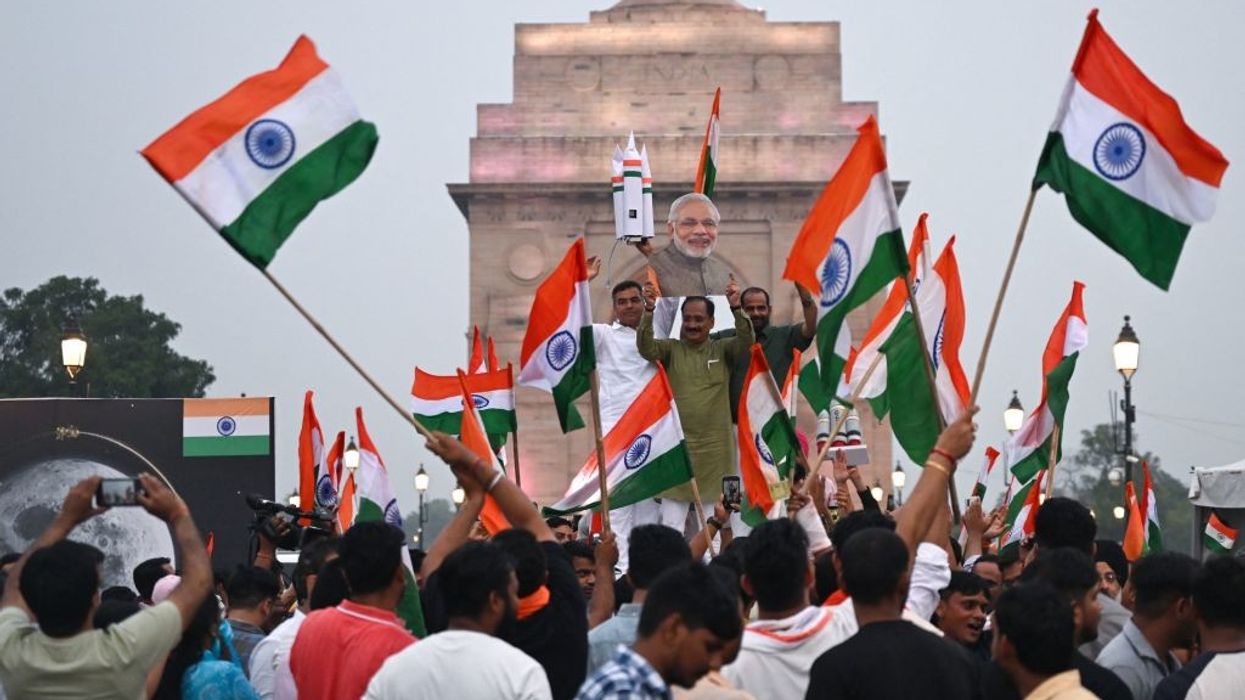AN Indian spacecraft landed on the rugged, unexplored south pole of the moon on Wednesday (23) in a mission seen as crucial to lunar exploration and India's standing as a space power, just days after a similar Russian lander crashed.
"This moment is unforgettable. It is phenomenal. This is a victory cry of a new India," said prime minister Narendra Modi, who waved the Indian flag as he watched the landing from South Africa where he is attending a BRICS summit.
Scientists and officials clapped, cheered and hugged each other as the spacecraft landed and people across India broke out in celebration, setting off firecrackers and dancing in the streets.
"India is on the moon," said S Somanath, chief of the Indian Space Research Organisation (ISRO) as the Chandrayaan-3 spacecraft landed, making India the fourth nation to successfully land a spacecraft on the moon after the US, China and Russia.
This was India's second attempt to land a spacecraft on the moon and comes less than a week after Russia's Luna-25 mission failed. People across the country were glued to television screens and said prayers as the spacecraft approached the surface.
Nearly 7 million watched the YouTube live stream.
Chandrayaan means "moon vehicle" in Hindi and Sanskrit. In 2019, ISRO's Chandrayaan-2 mission successfully deployed an orbiter but its lander crashed.
Russia's space agency Roskosmos congratulated India on the landing. "Roskosmos congratulates Indian colleagues on the successful landing of the Chandrayaan-3 spacecraft," it said in a post on its Telegram channel.
"Exploration of the moon is important for all mankind. In the future it may become a platform for deep space exploration."
Russian foreign minister Sergei Lavrov, at the BRICS summit, congratulated his Indian counterpart during their bilateral meeting, a video clip shared by the Russian foreign ministry showed.
The Chandrayaan-3 is expected to remain functional for two weeks, running a series of experiments including a spectrometer analysis of the mineral composition of the lunar surface.
The moon rover will take a few hours or a day to come out of the spacecraft, Somanath told reporters, adding that the landing has given India confidence to extend its reach to possible voyages to Mars and Venus.
India is also planning to launch a mission in September to study the sun, Somanath said. A human space flight is also planned and, while no official date has been announced, preparations are likely to be ready by 2024.
The landing is expected to boost India's reputation for cost-competitive space engineering. The Chandrayaan-3 was launched with a budget of $74 million, less than the cost to produce the 2013 Hollywood space thriller "Gravity".
Rough terrain makes a south pole landing difficult, and a first landing is historic. The region's ice could supply fuel, oxygen and drinking water for future missions.
"Landing on the south pole would actually allow India to explore if there is water ice on the moon. And this is very important for cumulative data and science on the geology of the moon," said Carla Filotico, a partner and managing director at consultancy SpaceTec Partners.
(Reuters)





